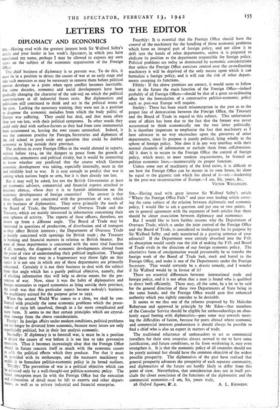SIR,—Having read with great interest Sir Walford Selby's article "
Where the Foreign Office Fails " and your own leading article cover- ing the same subject of the relation between diplomatic and economic policy, I would like to ask a question and put one or two points. I am in general agreement with the argument of both articles that there should be closer association between diplomacy and economics
But I would like to have further reasons why the Department of Overseas Trade, which is under the joint control of the Foreign Office and the Board of Trade, is considered so inadequate for its purpose by Sir Walford Selby. and only mentioned in a passing sentence of your editorial? If the Department were entirely absorbed into the F.O. its absorption would surely run the risk of making the F.O. and Board of Trade rivals in the direction of our foreign economic policy. The alternative form of amalgamation would presumably be to transfer the foreign work of the Board of Trade lock, stock and barrel to the Foreign Office, and make it one of the Departments under the Foreign Secretary. That would certainly be a drastic remedy, and I wonder if Sir Walford would be in favour of it?
There are essential differences between international trade and foreign policy, and it is not often that a man is found who is qualified to direct both efficiently. There may, all the same, be a lot to be said for the general direction of these two Departments of State being in the same hands; and the Foreign Office would gain that enhanced authority which you rightly consider to be desirable.
It seems to me that one of the reforms proposed by Sir Malcolm Robertson and approved in principle by Mr Eden—that members of the Consular Service should be eligible for ambassadorships on abso- lutely equal footing with diplomatists—goes some way towards meet- ing the difficulties of fusion, because for posts abroad where economic and commercial interests predominate it should always be possible to find a chief who is also an expert in matters of trade.
The traditional reluctance of ambassadors to act as commercial travellers for their own countries always seemed to me to have some justification, and future conditions, so far from weakening it, may even strengthen it. It is that the economic policy of all countries should not be purely national but should have the common objective of the widest possible prosperity. The diplomatists of the past have realised that general prosperity advances the prosperity of each separate community, and diplomatists of the future are hardly likely to differ from this point of view. Nevertheless, that consideration does not in itself pre- clude the closer association of the functions of the diplomatist and the commercial economist.—I am, Sir, yours truly,


























 Previous page
Previous page